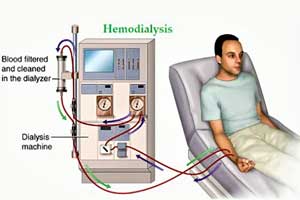- Home
- Editorial
- News
- Practice Guidelines
- Anesthesiology Guidelines
- Cancer Guidelines
- Cardiac Sciences Guidelines
- Critical Care Guidelines
- Dentistry Guidelines
- Dermatology Guidelines
- Diabetes and Endo Guidelines
- Diagnostics Guidelines
- ENT Guidelines
- Featured Practice Guidelines
- Gastroenterology Guidelines
- Geriatrics Guidelines
- Medicine Guidelines
- Nephrology Guidelines
- Neurosciences Guidelines
- Obs and Gynae Guidelines
- Ophthalmology Guidelines
- Orthopaedics Guidelines
- Paediatrics Guidelines
- Psychiatry Guidelines
- Pulmonology Guidelines
- Radiology Guidelines
- Surgery Guidelines
- Urology Guidelines
Hemodialysis may adversely affect vision of Kidney Failure patients

Hemodialysis (HD) may affect a range of ocular parameters in ESRD (end-stage renal disease) patients. The most obvious changes are exhibited in the dry eye parameters, retinal thickness (RT) and choroidal thickness (CHT).
These are the results of a new study published in the journal BMC Ophthalmology.
Xi Shen, Ruijin Hospital Affiliated to Shanghai Jiao Tong University School of Medicine, Shanghai, China, and colleagues conducted the study to explore ocular changes during HD in chronic renal failure patients and to determine the effects of different causes of renal failure during HD.
The study involved evaluation of 90 eyes from 45 ESRD patients undergoing HD. All ophthalmological examinations were conducted within 1 h before and after a single HD session. The HD patients were divided into primary kidney disease (KD), hypertensive KD, diabetic KD (DM-KD) and unknown etiology subgroups according to the primary etiology of renal failure. The statistics of 38 eyes from 19 healthy people were set as normal control.
Also Read: Low Hb associated with hemorrhagic stroke in hemodialysis patients
Key Results:
- Tear break-up time (TBUT), Schirmer's I test results, anterior chamber depth (ACD), lens thickness (LT) and choroidal thickness (CHT) decreased significantly after a single HD.
- The retinal nerve fiber layer (RNFL) thickness and average retinal thickness (RT) increased after HD, especially in the nasal inner macula (NIM) subfield, the inferior inner macula (IIM) subfield and the superior outer macula (SOM) subfield.
- TBUT, Schirmer's I test, IOP, RT, and CHT were correlated with one or more parameters.
- All ESRD patients regardless of etiology had the same trend for most parameters during HD, with the exception of the logMAR of BCVA, central corneal thickness, RNFL thickness, and CHT.
"HD may affect a range of ocular parameters in ESRD patients. Dry eye parameters, RT and CHT exhibited the most obvious changes. Different etiologies tended to have similar trends in ocular parameter changes during HD," concluded the authors.
"So, individuals with renal failure undergoing hemodialysis (especially those with renal failure due to diabetes) should be monitored for ocular changes that could put them at risk for vision-threatening complications."
For further reference follow the link: https://doi.org/10.1186/s12886-018-0885-0

Disclaimer: This site is primarily intended for healthcare professionals. Any content/information on this website does not replace the advice of medical and/or health professionals and should not be construed as medical/diagnostic advice/endorsement or prescription. Use of this site is subject to our terms of use, privacy policy, advertisement policy. © 2020 Minerva Medical Treatment Pvt Ltd